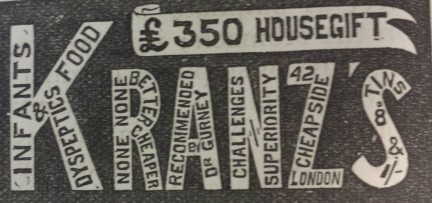For this month’s post we go right back to the early days of the journal, to May of 1888, just 6 years following the establishment of the Midwives Institute.
The most striking message given in this volume of the journal, is the mission of the Midwives’ Institute, and indeed of Nursing Notes – to reach all midwives throughout the country, educate them and support the campaign for recognition of professional and trained midwives. The journal was established to provide instruction for midwives and nurses who were unable to take advantage of the facilities offered by the Institute’s Club in London, which held a rich library of midwifery and obstetric works and hosted lectures by eminent physicians and surgeons. So we find papers and serialisations of articles which are intended as an educational tool, covering heart disease, nursing the insane, administration of medicine, the action of drugs, nutrition, and advice to probationers on practical matters such as tending their feet and hands and practical clothing to wear.
One of these themes, the administration of drugs by midwives, has been explored in this blog previously, particularly in reference to the use of opium. It was during the 1880s that opium became popular as a common medicine, and was used for the cure of many different ailments, from aiding sleep, to soothing pain, reducing severe perspiration, and relieving diarrhoea. Opium came in many formats – cough mixtures, liquid medicines, lozenges and suppositories, and with cases of opium poisoning increasing, nurses needed to acquire skills and knowledge to treating these cases, although the journal recognises that much of the common use of the drug came from ‘the numerous class of people who have acquired the habit of administering the drug themselves.’ Reading an article later in the journal by Zepherina Veitch, founder and a leading member of the Midwives Institute, it would be interesting to know how many nurses followed the alleged advice of Florence Nightingale for nurses to taste all their medicine prior to giving it to the patient – in particular when it came to administering opium!
A short history of the Midwives’ Institute appeals for new subscribers, one of the main member benefits cited being the Club Library, which loaned books and sent books out to members ‘in the country’. The Club also acted as a registry for members and the public, connecting those who were seeking employment with those requiring nurses, as well as providing a list of midwives who had passed the Obstetrical Society’s examinations for consultation. Supporting and assisting midwives was all part of the Institute’s mission ‘to raise the efficiency and improve the status of midwives and to petition Parliament for their recognition’, and a stark note is included that ‘the proper registration of midwives seems as far off as ever’ while ‘England still remains notorious for being the only civilised country where unlicensed and uncertificated women can practice midwifery’. How different from the words in this same journal during the 1940s and 1950s where there is evidence that the good reputation of England’s midwifery practice and training is respected internationally.
These early editions of Nursing Notes are comparatively stark and bare, with none of the sketches and drawings (and later photographs) of advertisements for uniforms and drugs. There is only this small hand-drawn advertisement for Kranz’s infant food, which appears rather amateur by today’s standards!
My favourite article this month is an anonymous one by ‘Housewife’ on Little Meals, providing recipes for tea and supper which could be served up to the invalid. I reproduce some of these below for those who would like to experience a Victorian supper!
Chocolate: ‘the chocolate used should be good French chocolate, one ounce should be used for each person, and this should be broken up and put in a tall beer jug with a little water and milk and placed in a saucepan of water over the fire to dissolve and become quite hot. Boil a pint of milk, and when frothing up pour it quickly on the melted chocolate, and keep it frothed up by beating it with a fork, put in a lump of sugar on which you have dropped two drops of essence of vanilla.’
Kettle broth: ‘take some small slices of bread, butter it well on both sides, add pepper and salt, and fill a breakfast cup or broth basin with it, add finely chopped parsley or celery tops and put boiling water on it to fill the cup, place the saucer over it and let it stand by the fire for five minutes, so that the bread may be swelled. It is better made with weak chicken broth.’
Eggs: ‘To mix egg with tea is more difficult, and it is better to omit the white if its presence is to be concealed. Eggs may be quite disguised in coffee; beat the yolk very thoroughly, add a little milk slowly, take care the milk is not boiling, beat it all the time you add coffee or milk.’
A Yard of Flannel (a Midland’s nightcap): ‘hot beer with an egg beat up and poured from glass to glass till well frothed.’
